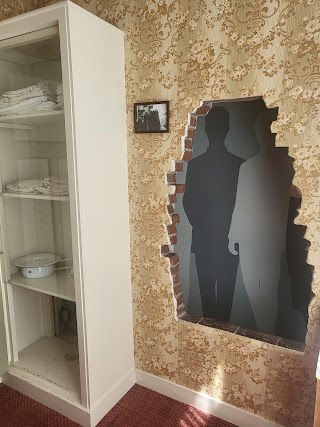 |
| The Corrie ten Boom House and Museum |
 |
| This was the entrance to the hiding place. The six who hid there had 70 seconds to get in and close it. I couldn't get into it in 70 seconds. |
 |
| The hiding place |
The way I see things.
 |
| The Corrie ten Boom House and Museum |
 |
| This was the entrance to the hiding place. The six who hid there had 70 seconds to get in and close it. I couldn't get into it in 70 seconds. |
 |
| The hiding place |
Maybe you didn’t consider this.
Maybe you think that wearing a mask is silly.
I’d like to tell you about how some people’s refusal to wear masks affected one man.
I’d like to tell the people the community leaders how their failure to enforce wearing masks and social distancing in indoor spaces affected one man.
There was a man who loved going to a weekly meeting more than about anything. He was a very social man, had been living alone for several years. Going to his weekly gathering was a lifeline for him. Of course, the Covid-10 pandemic changed all of that. Having seen people with polio and tuberculosis in his lifetime, he tried to heed the advice of scientists, doctors, and experts. He tried to keep socially distance even though it was the most difficult thing in the world for him. He wore a mask to keep himself and others safe. He thought it was only sensible that everyone else did too.
The last time he went to the weekly meeting he so loved, he was nervous about being there. His children had scolded him from time to time about being careful. Sometimes he couldn’t resist the temptation to be with people there. One day he said he went in and chose a seat reasonably distant from others. But soon after a whole family, entirely unmasked, came and sat right next to him, too close.
It made him uncomfortable, so he left. He never went back. He was disappointed that the leaders not only didn’t enforce any kind of safety measures but at times even openly flouted measures to do their part to stem the wave in the community that is only now starting to wane. He told me he didn’t know if he’d ever go back.
And as it turned out, he never did.
When he died, it wasn’t Covid-19 that caused his death.
His last few months of life would have been happier if he had felt comfortable going to what was once his favorite place to be.
So maybe you think that wearing a mask and socially distancing all this time is just a “personal decision.” And it is.
But it personally affects others in ways you may not have considered. Or maybe you just don’t care about how it hurt other people in your headlong determination to make a political statement.
 |
 |
| Remains of human beings killed in Majdanek. There are no known photos from Belzec, Chelmno, Sobibor, and Treblinka except for pictures of perpetrators. |